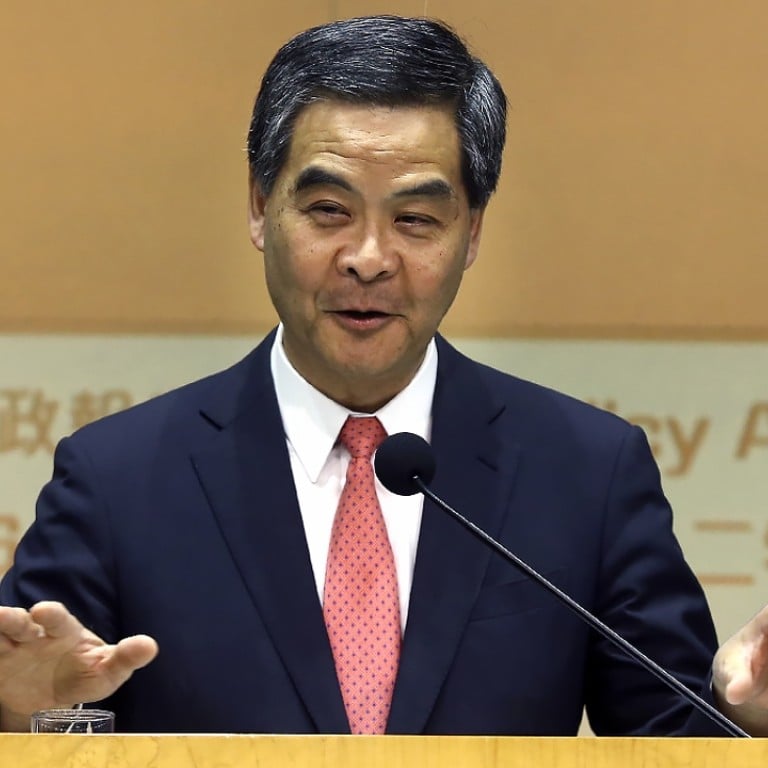
We get it, CY ... One Belt, One Road gets record-breaking 48 mentions in policy address
ANALYSIS: Free of the constraints of accountability that would have been brought by universal suffrage, and with Beijing fully behind him, Leung was all business in the policy address, focusing on the national agenda
Leung Chun-ying, who has been tirelessly telling Hongkongers about the importance of seizing opportunities arising from the country’s “One Belt, One Road” strategy over the past two years, meant business when he delivered his fourth policy address.
“The Belt and Road ” – itself an improvisation from the original phrase – referring to the country’s push to drive cooperation among Eurasian countries along the ancient Silk Road, was mentioned 48 times by the chief executive during his two-hour speech.
It is the phrase which has appeared most frequently in any single policy address since the handover, surpassing oft-cited slogans like “one country, two systems”.
Initiatives to facilitate economic development, including measures to exploit the “One Belt, One Road” strategy and the HK$4.5 billion investment to promote innovation and technology, were the main themes of the policy speech which is seen as a make-or-break blueprint for Leung.
His repeated mantra of “One Belt, One Road” stood in sharp contrast to the omission of hot-potato topics such as political reform, growing anti-mainland sentiment and the rise of localism.

It was the first time constitutional reform did not merit a mention in policy addresses since Leung took office in 2012, and the third time it was not raised in a policy blueprint since the 1997 handover.
It is uncharacteristic of Leung, known for his uncompromising and combative style, to avoid controversial topics. Last year, he used the policy address to criticise the University of Hong Kong’s student union for an article in its magazine Undergrad championing self-determination. Last month, he appointed Arthur Li Kwok-cheung as the chairman of the HKU council, despite opposition from staff and students.
Professor Ma Ngok, head of Chinese University’s department of government and public administration, said Leung used his address to tell the central government he was mobilising resources in Hong Kong to accommodate the country’s development strategy.
“It is an open secret that Leung intends to seek re-election next year and his top priority is to win Beijing’s blessing,” Ma said. “There is no better way to please the central government than toeing to the country’s development strategy.”
Ma said tackling sensitive political issues, such as last year’s denunciation of the student magazine, would divert media attention from his efforts to seize the opportunities offered by the country.
If he seeks re-election, by next January he will be in full campaign mode for his last policy address, just two months before the vote. So it was Leung’s last chance to announce and execute a full year’s initiatives and boost his flagging popularity.
A recent study by the HKU public opinion programme found his popularity rating had plunged 5.2 points to 37.5 out of 100 from mid-December, hitting a new low. Even Leung may not pin high hopes on his policy address to boost his standing.
“As the next chief executive will be chosen by the 1,200-strong election committee dominated by the business and professional elite, Leung doesn’t care much about his popularity as long as he enjoys Beijing’s support,” Ma said.
Some government allies were not impressed by Leung’s emphasis on the “One Belt, One Road” initiative. James Tien Pei-chun, honorary chairman of the Liberal Party, criticised him for going on and on with the grand plan but failing to introduce immediate relief measures for the struggling retail and catering industries.
What Leung did do was to pepper his speech with piecemeal measures to tackle livelihood issues.
For example, he pledged to build three lift and pedestrian walkway systems in Tsing Yi, Kwai Chung and Kowloon City. He also promised to provide 70 additional subsidised day care places this year and next year to support local elderly residents.
The government will also consider providing larger toilet cubicles in new public toilets for priority use by elderly people.
Again, Leung, who campaigned in 2012 with the slogan “livelihood is no trivial matter”, meant business – even if at some points, the chief executive’s policy address sounded more like a report from a district councillor.

